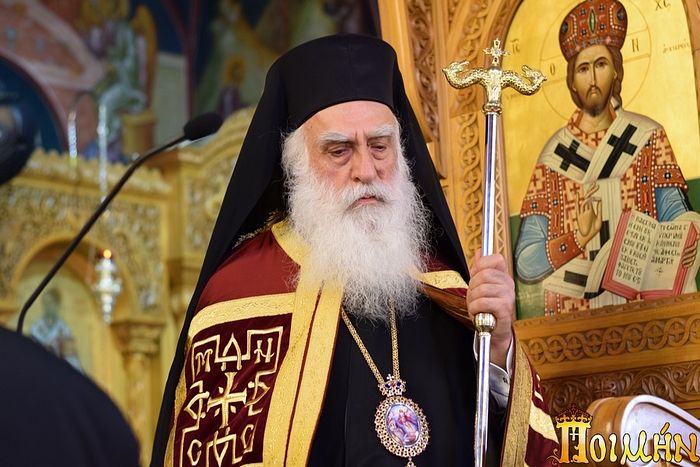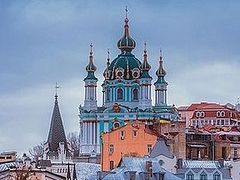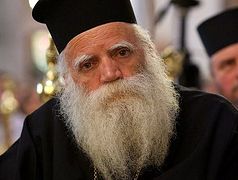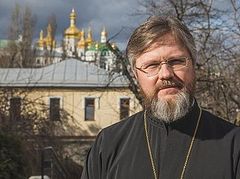New Smyrna, Greece, October 10, 2019
Another hierarch of the Greek Orthodox Church has bravely raised his voice against the prospect of recognizing the lawless and anti-canonical actions of the Patriarchate of Constantinople.
His Eminence Metropolitan Simeon of New Smyrna spoke of the great spiritual suffering that the Ukrainian crisis causes him and called on his brother hierarchs in a letter not to make any hasty decisions, as the bishops of the Greek Church prepare to gather on Saturday to hear and deliberate upon a report from their primate, His Beatitude Archbishop Ieronymos of Athens and All Greece, on the matter.
The full text of the letter is published on Romfea, and several other Greek outlets.
His Eminence was prompted to write the letter after Abp. Ieronymos announced the convening of an extraordinary session of the Bishops’ Council on Saturday specifically to address the Ukrainian issue, which was not included on the agenda of the regular session that is currently underway.
His Eminence also spoke out in the spring of 2016, in the lead-up to that summer’s Crete council, where each Local Church sent a pre-determined delegation, saying the council could not be considered pan-Orthodox unless every bishop was invited.
The current situation in the Orthodox Church, connected with the burning “Ukrainian question,” in which the Moscow and Constantinople Patriarchates “are in a state of unprecedented dispute over the governance of the Church,” causes the hierarch “deep regret and great suffering” in his soul.
The Holy Synod of the Russian Church broke communion with Constantinople last October, after the latter groundlessly restored and entered into communion with schismatics on the canonical territory of the Ukrainian Orthodox Church under His Beatitude Metropolitan Onuphry of Kiev and All Ukraine. Since then, the Greek hierarch writes, the Russian Church is also “taking actions that interfere with Church unity and respect for [Constantinople’s] ecclesiastical and canonical space,” which threatens a serious schism in the Church, referring to the fact that Russian clergy have been serving Liturgies in Turkey.
Moreover, the entire situation places the Orthodox Church at a disadvantage in the eyes of Orthodox Christians and of the entire world, Met. Simeon believes.
He also fears that ethnophyletism will lead to the Church dividing into warring Greek and Slavic factions.
However, at this point, none of the Greek-speaking autocephalous Churches or those in the Greek sphere of influence have supported Patriarch Bartholomew’s blunder in Constantinople. At this point, only the Church of Greece itself could make a decision on ethnic grounds. There are those hierarchs of the Greek Church, including Metropolitan Chrysostomos of Dodoni, who have explicitly called for the Church to stand with Constantinople precisely because of the shared Greek blood.
While declining to go into the historical and canonical aspects of the Ukrainian crisis, because various interpretations of the canons do exist in the Orthodox world today, he does emphasize that “we do not live in the 4th century,” and that “the Church structures now are not the same structures that once existed around the Mediterranean basin… Serious changes are taking place around us. Can we ignore them?”
Met. Simeon also makes the crucial point that “Ukrainian autocephaly and the conditions in which it was provided have nothing in common with any other autocephaly previously provided by our Ecumenical Patriarchate.”
In previous cases, autocephaly was requested by the canonical Local Churches of new states, “and in many cases the Churches were supporting secular institutions.”
However, “the recognition (without an expression of repentance) of the Ukrainian schismatics, bypassing not only the canonical Ukrainian Local Church, but also the Moscow Patriarchate, evokes many questions and a corresponding reaction.”
The Greek hierarchs must remember, writes Met. Simeon, that while Ukraine as a whole is a single national entity, there are now two parallel churches operating there and two metropolitans of Kiev. And while geopolitical aspirations are played out in Ukraine (he specifically mentions the involvement of the United States), “we, the responsible pastors of the Church, must first of all fight for the unity of the Church of Christ, so that we can be one with all.”
Is the reaction of the Church of Russia purely ecclesiastical, he wonders, or does it also indicate the Kremlin’s desire to keep Ukraine within its sphere of influence? Of course, outlets representing the Patriarchate of Constantinople have been working overtime to push the latter narrative.
The Metropolitan of New Smyrna also notes, as have many hierarchs, that Constantinople claimed the granting of autocephaly to a group of schismatics would somehow overcome the schism in Ukraine, though the exact opposite has proven to be true.
He also notes the repeated cases of accusations and abuse against parishioners and parishes of the canonical Church. The hierarchs of the schismatic church, however, continually lie to the media, claiming there have been only peaceful parish transitions to their schismatic structure.
Moreover, Met. Simeon writes, the newly-created “Orthodox Church of Ukraine” (OCU) was dysfunctional from the beginning, which led to the departure of “Patriarch” Philaret Denisenko, whom Constantinople unilaterally declared to be a valid hierarch in good standing.
The Greek Church is governed synodally, not patriarchally, he writes, and thus the decision to recognize the OCU or not should not be left up to either the primate alone or the Holy Synod, but to the Bishops’ Council, which includes all the hierarchs of the Church.
Recall that the Holy Synod placed responsibility for the Ukrainian issue precisely in the hands of the primate, Abp. Ieronymos, in August, who decided to convene a session of the Bishops’ Council this coming Saturday. However, the issue is very serious and must not be rushed, Met. Simeon believes. Rather, it should be included on the agenda of the next regularly-scheduled session of the Bishops’ Council. To deal with it in a hurry will only cause problems for the Greek Church, and “it is a mistake to believe that such an approach will support the Ecumenical Patriarchate,” Met. Simeon writes.
All points of view should be heard out, he writes. “We need to listen to all sides. Both, of course, are in a hurry to present their opinions in writing, but passion destroys the mind, and the despair of another hurts the love of Christ. The Church is a society of love,” the Greek hierarch writes, also emphasizing that all Orthodox Christians, regardless of ethnicity or nationality, are of the one Body of Christ.
“The Church does not belong to us. We belong to the Church for the Lord’s sake. The Lord Jesus Christ is the Head of the Church, not us, whatever function we seek to perform in the Church with God's blessing… The love and care of the Lord for His Church is comparatively superior to ours. That is why we must fervently pray that the Lord will enlighten our hearts and minds,” Met. Simeon instructs.
The Greek hierarch would like to believe that Patriarch Bartholomew, “an ecclesiastical man of gifts,” will do everything in his power to save the Church from the situation it has fallen into.
To date, however, Pat. Bartholomew has refused to call a pan-Orthodox council to resolve the matter, although he has been counseled to do so countless times by his brother hierarchs.
He nevertheless urges the Greek hierarchs “to take any necessary initiative and take any actions that the Church considers necessary for the peaceful settlement of this issue.”




